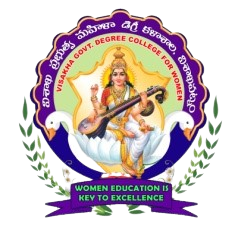VISAKHA GOVERNMENT DEGREE COLLEGE FOR WOMEN
(Affiliated to Andhra University)
ACADEMIC CURRICULUM POLICY
1. INTRODUCTION
-
This policy supports Teaching and Learning Policy, which outlines the College approach in providing outstanding teaching and learning.
-
This policy document is pursuant to the requirements of the Higher Education which states that the college must ensure that there is “a written policy on the curriculum, supported by appropriate plans and schemes of work”.
2. Policy aim
-
The aim of this policy is to outline the College approach to the provisions of academic programs, the aims of those programs and the student cohorts for which they have been developed.
-
The policy also includes outline information about each academic program. Further details can be found by referring to the individual curriculum plans of the departments of the college.
3. General principles underlying the policy
-
The Academic Council of the College shares and upholds the values and principles set out in Teaching and Learning Policy
-
Faculty of the College receive training, guidance and support, enabling them to contribute to the provision of outstanding teaching and learning at College, as set out in the group of policies and procedures that support teaching and learning practices.
-
Faculty of the college are conversant with and abide by College academic policies and procedures in vogue.
4. Aims of the Curriculum
The aims of our curriculum are:
4.1 Support
-
To support the students in their academic preparation for progression to further or higher education
-
To individually support students in learning difficulties, where/when identified, drawing on internal and external expertise to ensure that the students’ learning needs are appropriately addressed.
-
To provide a safe and secure learning environment.
4.2 Development
-
To provide programme and subject choices that support students’ learning and general development, enabling them to progress and work towards achieving their goals
-
To develop communicative, professional and study skills required to access and succeed in their endeavours to further or higher education
-
To develop independent learning skills of the students and engender the resilience and independence required for further/higher education.
-
To stretch and challenge the enquiring minds of our students, and encourage them to strive for excellence
-
To enable the students to be creative, innovative and entrepreneurial
-
To support the students’ spiritual, moral, intellectual and physical development and to enrich their studies beyond teaching and learning around the core content.
4.3 Attitude and outlook
-
To promote a positive attitude towards learning so that all students enjoy coming to college and participate in the college activities
-
To inculcate awareness among the students in promoting respect towards society and each other through curriculum, extra-curricular programs, enrichment and charity organizations.
-
To promote inclusion and harmony among students of various cultures, and to engender respect for culture, heritage and spiritual beliefs and values, including the opportunities, responsibilities and experiences of life in the society.
5. College students
-
The majority of students hail from rural areas, entering the college for their further Education.
-
As the students are, in general, intensely focused on university progression, we guide them to apply for the appropriate universities/institutions of higher learning for their career development.
6. College programs
-
College offers a wide range of educational programs to the students that enable them to acquire vital skills in literacy, numeracy, speaking, listening, research and presentation through a curriculum delivered in a variety of imaginative and inclusive ways (e.g. group projects, debates etc.).
-
The students follow a curriculum that gives them experience in the fields such as HVPE, ICT etc., which are not taught as discrete subjects. Students have access to accurate, up-to-date and impartial career guidance and are counselled on their options for further education/career.
7. Assessment
-
Please refer to the program assessment policies and procedures for complete information regarding internal and external assessment.
8. Curriculum Revision
Any educational institute has to review and revise its curriculum frequently to achieve academic excellence. Curriculum Revision Policy is to ensure the curriculum components are consistent with recent updates in the subject concerned.
When the faculty feels that the existing curriculum of a particular course is not addressing local, national and institutional standards, the faculty represents the same to the BOS of the affiliated Andhra University. In some cases there may be a need to remove outdated or unnecessary material or addition to the existing one
The requisition for curriculum revision to the affiliated university may be required for reasons including, but not limited to, the following:
-
Changing academic, industry, and/or community needs
-
Changes in pedagogy or instructional methodology
-
Changing needs of students
-
New directions and initiatives from government
If, sometimes, it is found that the affiliated university does not implement the urriculum revision, then that particular course can be offered as a certificate course or taught as a part of curricular value enrichment.






